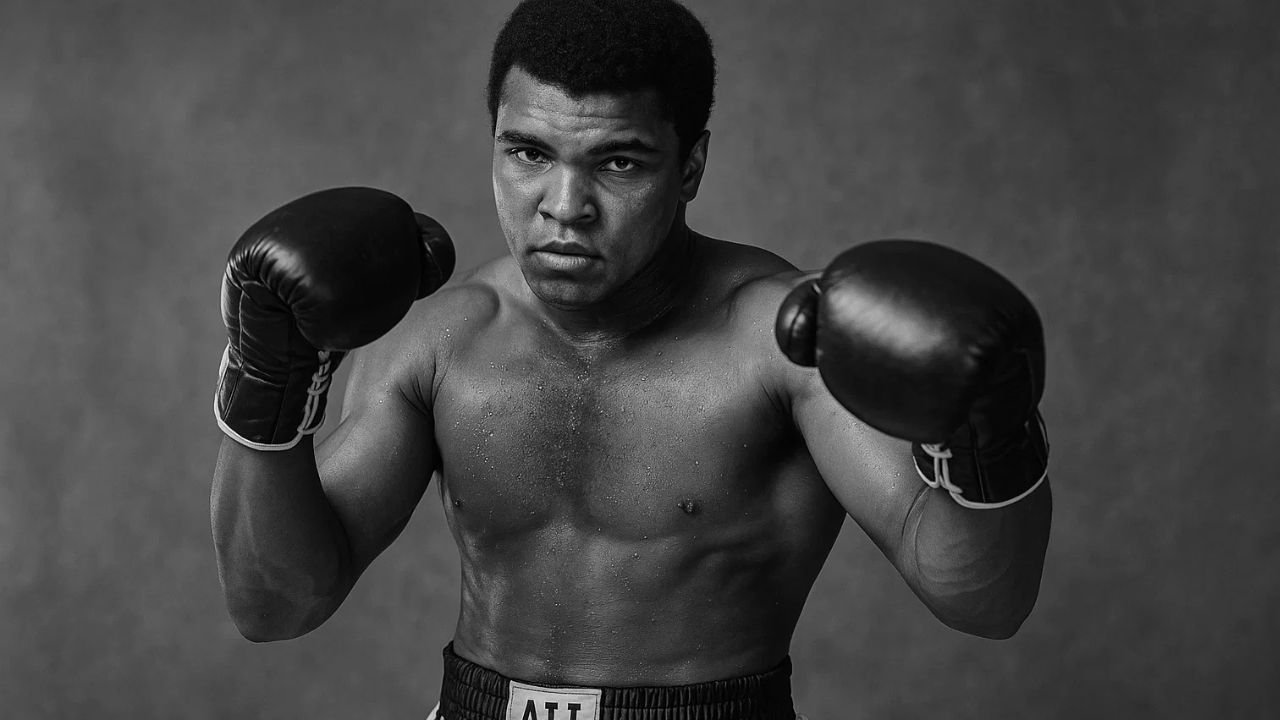Introduction: Who Was Muhammad Ali?
Muhammad Ali, born as Cassius Marcellus Clay Jr., is widely regarded as the greatest heavyweight boxer of all time. Beyond his unparalleled boxing skills, he was a civil rights activist, humanitarian, and a global icon. His charisma, courage, and confidence reshaped not only the sport of boxing but also the social and political landscape of his time.
Early Life and Background
- Birth Name: Cassius Marcellus Clay Jr.
- Born: January 17, 1942
- Birthplace: Louisville, Kentucky, USA
- Parents: Cassius Clay Sr. (a sign painter) and Odessa Grady Clay (a housemaid)
- Nationality: American
He grew up in a segregated America and faced racial discrimination from a young age. At age 12, after his bicycle was stolen, Clay reported it to a local policeman named Joe Martin, who introduced him to boxing. This incident ignited the fire that would lead to a legendary career.
Amateur Career and Olympic Success
Muhammad Ali had a stellar amateur career with 100 wins and only 5 losses. His defining moment arrived in 1960 when he claimed the gold medal in the light heavyweight category at the Rome Olympics, proudly representing the United States
Turning Professional: The Rise of a Champion
Ali turned professional later in 1960. With his lightning-fast footwork and unique style—keeping his hands low and relying on speed—he quickly gained popularity.
He famously declared:
“I am the greatest! I said that even before I knew I was.”
His early fights were mostly knockouts, and his trash talk was revolutionary, using poetry and rhyme to mentally defeat opponents before the match even began.
Becoming the World Heavyweight Champion
Ali made history on February 25, 1964, when he defeated Sonny Liston at the age of 22 to become the new world heavyweight champion.. It was during this time he Following his embrace of Islam, he changed his name to Muhammad Ali, explaining that he was leaving behind the slave name of Cassius Clay
Vietnam War Controversy and Ban
In 1967, Ali refused to be drafted into the U.S. Army for the Vietnam War, citing his Islamic beliefs and opposition to the war:
“I ain’t got no quarrel with them Viet Cong.”
As a result:
He was stripped of his boxing titles
Banned from boxing for 3.5 years
Convicted of draft evasion, though the U.S. Supreme Court overturned the conviction in 1971
This act made him a symbol of civil rights, religious freedom, and anti-war activism.
Legendary Comeback Fights
Ali returned to the ring in 1970, and what followed were some of the most iconic matches in boxing history.
1. The Fight of the Century (1971)
- Opponent: Joe Frazier
- Result: Ali lost in 15 rounds – his first professional defeat
- Venue: Madison Square Garden, New York
2. The Rumble in the Jungle (1974)
- Opponent: George Foreman
- Result: Ali won via KO in round 8 using his famous “Rope-a-Dope” strategy
- Location: Kinshasa, Zaire
3. The Thrilla in Manila (1975)
- Opponent: Joe Frazier (rematch)
- Result: Ali won after Frazier’s corner stopped the fight in the 14th round
- Often remembered as one of the most physically demanding fights in the sport’s history
Career Statistics: Muhammad Ali’s Total Fights
- Total Fights: 61
- Wins: 56
- Wins by Knockout (KO): 37
- Losses: 5
- Draws: 0
- No Contests: 0
- Titles Held: 3-time Lineal Heavyweight Champion, 2-time WBA Champion
Ali was the first boxer to win the heavyweight title three times, cementing his place in history.
Unique Boxing Style and Influence
Ali’s style was revolutionary for a heavyweight:
- Fought with hands down, relying on reflexes and speed
- Used psychological warfare through rhyming taunts
- Created the “Ali Shuffle” and the “Rope-a-Dope” strategy
He inspired generations of fighters like Mike Tyson, Floyd Mayweather, and Tyson Fury.
Religious Conversion and Faith
Ali converted to Islam in 1964 and became a member of the Nation of Islam. Later, he followed mainstream Sunni Islam and was known for his spiritual depth and moral clarity.
He traveled the world as a Muslim peace ambassador, promoting religious tolerance, education, and humanitarianism.
Retirement and Health Challenges
Ali retired in 1981 after losing to Trevor Berbick. In 1984, he was diagnosed with Parkinson’s disease, a progressive neurological disorder likely caused by head trauma sustained during his boxing career.
Despite the illness, he remained active in public life:
- Supported the Special Olympics
- Traveled for charity missions
- Met world leaders and promoted peace
Death and Global Mourning
- Died: June 3, 2016
- Place: Scottsdale, Arizona, USA
- Cause: Septic shock due to respiratory illness
- Age: 74
His funeral in Louisville, Kentucky was attended by global figures like Bill Clinton, Turkish President Erdoğan, and Will Smith (who played him in the 2001 film Ali).
Famous Muhammad Ali Quotes
- “I am the greatest. I said that even before I knew I was.”
- “Don’t count the days; make the days count.”
- “Service to others is the rent you pay for your room here on Earth.”
- “If my mind can conceive it, and my heart can believe it—then I can achieve it.”
Legacy: Why Muhammad Ali Still Matters
Muhammad Ali’s legacy goes far beyond sports:
- Champion of the oppressed
- Voice of resistance during war and injustice
- Role model for generations of athletes
- Global humanitarian and peace symbol
In 2005, he received the Presidential Medal of Freedom, the highest U.S. civilian honor.
Conclusion
“Muhammad Ali wasn’t just a boxing legend—he was a worldwide icon who transcended sports. From winning Olympic gold to dominating the ring, challenging injustice in courtrooms, and standing firm in anti-war protests, his journey stretched from Louisville’s streets to inspiring millions worldwide with his strength, conviction, and unwavering purpose.”
He may be gone, but his words, spirit, and punches still shake the world.
“The Greatest” was never just a title. It was the truth.
